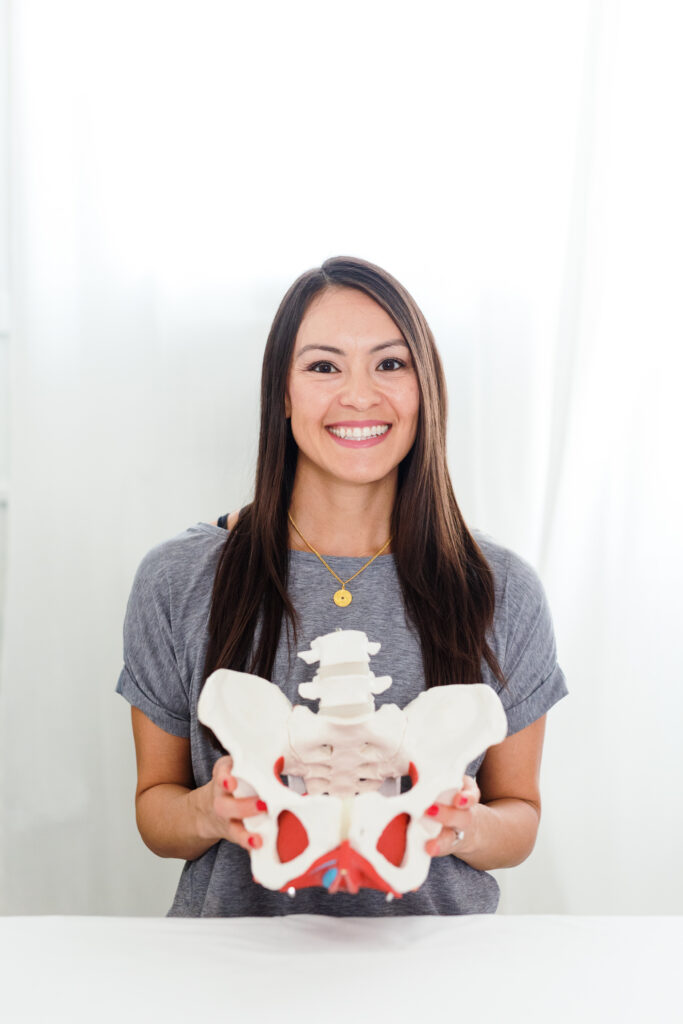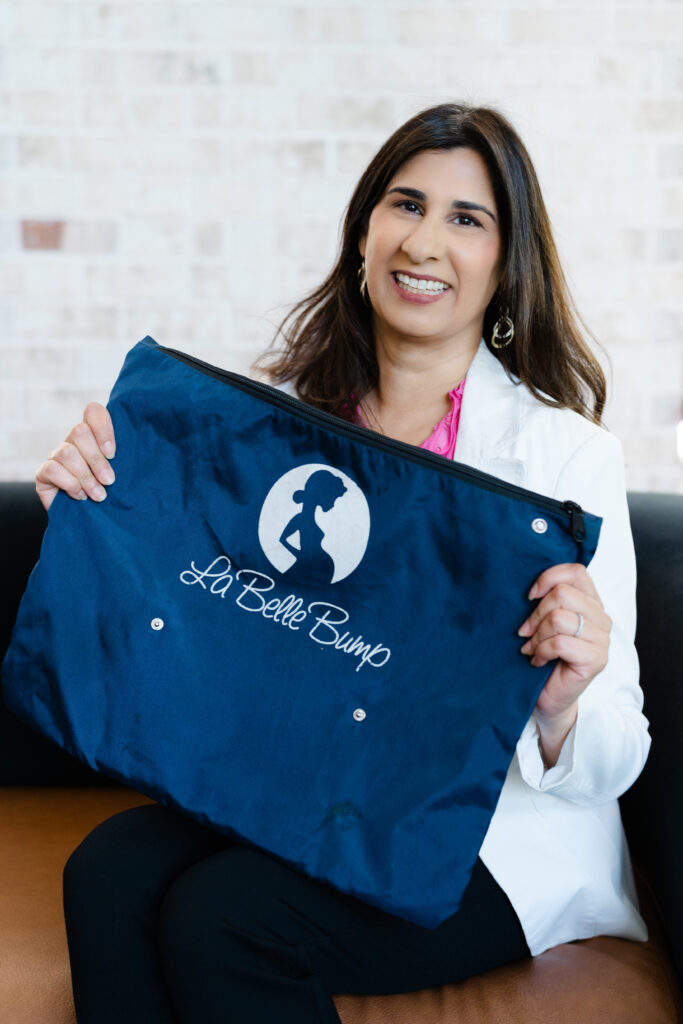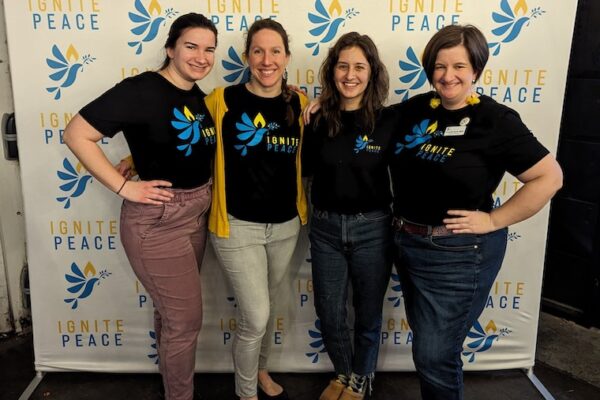One late night 10 years ago, Chelsea Hirschhorn, AB ’06, struggled to settle her sick infant back to sleep. She tried clearing the baby’s congestion with a hospital-provided bulb syringe, but she found it hard to manage — not to mention gross.
After a few more stressful, sleepless hours, she remembered a different kind of aspirator stashed in the medicine cabinet. Hirschhorn’s Swedish neighbor had placed the package in the mailbox months earlier, a sweet gesture for a first-time mom. It was worth a shot.
The superiority of the Swedish snot-sucker was immediately obvious. “This is crazy that no one told me about this,” Hirschhorn thought at the time. Why didn’t all parents have access to a basic item that could make a necessary, and frankly disgusting, task so much easier?
Now CEO of Frida, as well as a mom of four, Hirschhorn provides fertility, baby hygiene and postpartum care products far beyond the flagship NoseFrida. Frida products appear in tens of thousands of retail stores, from Target to CVS, and in innumerable baby shower gift bags. Earlier this year, it was named a TIME100 most influential company.
And Hirschhorn is not the only Washington University in St. Louis graduate making strides through entrepreneurship to improve the lives of caregivers.

Sara Reardon, AB ’04, DPT ’07, has built a massive online following devoted to her clinical specialty, pelvic floor health. Through her brand The Vagina Whisperer, she provides exercise regimens and vital information to help women deal with pelvic floor problems, which often arise during pregnancy and childbirth. (She’s also been featured in TIME.)
Anita Rajendra, AB ’98, has founded two companies to help moms look and feel their best during and after pregnancy. She runs both La Belle Bump, a subscription-based maternity clothing company, as well as Mina & Vine, a brand of patent-pending nursing scarves.
Hirschhorn, Reardon and Rajendra offer different products or services, and they have pursued different business models for the companies they founded. But their journeys share two important threads: a WashU education and the personal, messy frontlines of motherhood.
‘There has to be a better way’
The timing of Hirschhorn’s first night using the future NoseFrida proved fortuitous. A lawyer at the time, she had no intention to start a company. But the neighbor who had gifted the device already ran a small-scale operation selling it to medical professionals, and she was actively looking to sell the business. Hirschhorn saw a chance to bring a valuable product directly to customers.
“I think that’s common amongst a lot of entrepreneurs,” Hirschhorn says. “You have a problem, and very selfishly you try to solve it in the best way possible. And then you realize that it’s a ubiquitous problem that you could solve on behalf of a lot more people.”
A similar train of thought led to Rajendra’s businesses. She always wanted to own her own company, but it took some time to find an idea that would justify taking the leap away from a marketing job at Coca-Cola into her own venture. The winning concept eventually came from her own and her coworkers’ struggles. While at a meeting, a pregnant colleague complained about buying maternity clothes.
“By that time, I’d had my three children, and I’d worked through all three pregnancies,” Rajendra says. “I remember when I was pregnant and wanting and needing new clothes, especially for work, but I didn’t want to spend the money on it. I just thought, ‘there has to be a better way.’”
Motherhood, unfiltered
Like Hirschhorn and Rajendra, Reardon helps mothers navigate the less discussed, sometimes less pleasant parts of motherhood. Going a step further through her Instagram platform The Vagina Whisperer, she amplifies the experiences of women who experience deeply uncomfortable things like painful sex or leaking urine long after childbirth. To date, she has more than 600,000 followers.
As a pelvic floor physical therapist in New Orleans for more than a decade before starting The Vagina Whisperer, Reardon saw the consequences of a health-care system that often prioritizes babies more than moms. Not only did women not know how to care for their pelvic floor — the web of muscles that supports the uterus, along with the bowels and bladder — most patients lacked basic awareness about this important part of their bodies.
“Day in and day out, you see women coming in, whether they’re younger women, older women, or women going through pregnancy or postpartum, and they have no idea that this part of their body exists,” Reardon says. “We all use it every day! It’s so integral to peeing, pooping, breathing, sleeping, having sex and giving birth. And yet nobody was talking about it.”
Reardon still works with patients, and she sees herself as first and foremost a health-care provider. With The Vagina Whisperer, she uses social media and subscription-based exercise classes to spread knowledge to more people in need. Her own two pregnancies brought even more urgency to the mission.
“Everybody needs this information, particularly during pregnancy and postpartum, when we go through such a huge physical transformation,” she says. “I think that we are so underserved when it comes to our postpartum recoveries and processing birth, that it is a real tragedy.”
Frida also has made strides in normalizing unfiltered postpartum realities. In 2020, an ad for Frida Mom was banned from social media channels and the Oscars television broadcast. The commercial showed a new mom struggling to get up from bed and go to the bathroom while listening to her newborn’s cries. On YouTube, the ad now has more than 6 million views.
To better inform and educate parents and parents-to-be, Hirschhorn’s team launched Frida Uncensored in April. The site provides instructional videos for using Frida Mom products, which can require nudity. Women deserve clarity rather than euphemisms, Hirschhorn believes.
“Women need to be educated on how to prepare for that physical transformation into motherhood,” Hirschhorn says. “We were really trailblazers in pioneering marketing and content catered to women’s health that broke down and destigmatized the category meaningfully. And I think we’ve made some significant progress, but still a lot of work needs to be done.”
Humor has entered the chat
Inadequate health care. Struggling to walk to the bathroom, and later peeing every time you sneeze. Engorged breasts. A screaming baby who refuses to take medicine or to latch while breastfeeding. And in the background, that sinking “mom guilt” feeling that it’s somehow all your fault.
In their businesses, Hirschhorn and Reardon both realized that, alongside an unfiltered view, sometimes the best antidote to these everyday parenting tragedies can be a much-needed dose of levity.
Frida’s website peppers visitors with tongue-and-cheek wordplay like “s’not to worry” and “your all access [gas] pass.” Frida packages showcase cute cartoons that make the products approachable and emphasize their ease of use. For sleep-starved parents, simplicity is key.
“The bedrock of the business is based on innovation, and then the blanket on top of the innovation is the infusion of levity and lightheartedness into an otherwise dark, serious experience for most parents,” Hirschhorn says.
“We’re not comics, but it’s important to be lighthearted about the experience. Otherwise, you can get pretty depressed at 3 a.m. when you’re dealing with baby who’s sick, or you’re elbow deep in a dirty diaper, or you’re in the dark valley of potty training.”
Outside of the retail sphere, social media has offered a perfect home for Reardon’s effervescent, seemingly effortless comedy on The Vagina Whisperer. She runs down the street in her signature vulva costume and dances to the latest hits, all while providing accurate medical information.
“It’s not funny to everybody, but it’s funny to me,” Reardon says of the vulva outfit. “I think any opportunity we have to make this process better and more comfortable and less painful for women is success.”
Growing pains and successes
After the early success of NoseFrida, Hirschhorn found that it takes more than one product to build a brand. She moved forward as she started, centering the merchandise on “the frontlines of parenthood,” she says. The second product, the MediFrida, eased the process of delivering medicine to a squirmy infant. It also proved a success, and the company kept growing from there. Every launch focused on accessibility, from price point to store availability.
“It was very common in the early 2010s to build direct-to-consumer businesses, where customers check out from your website,” Hirschhorn says. “I very intentionally departed from that strategy. As a parent, it wasn’t how I wanted to shop. These are problems that I needed to have solved at 3 a.m. by running to the nearest CVS or Walgreens. You don’t even have time to wait for Amazon,” she says.
For Rajendra, creating and growing La Belle Bump meant building the technical backbone for a new kind of company — one that merged a rental business with online personal stylists. On La Belle Bump’s website, customers fill out a style profile and receive personalized picks from a stylist. (A human one rather than AI, Rajendra emphasizes.) From there, the company choreographs a complicated dance of reviews, returns and new rentals to fit the customer’s desires and changing size.
“We had to create something on the back end to ensure that 1) we know exactly where every piece of clothing is, and then 2) that we could incorporate customer feedback. It’s a good amount of process,” Rajendra says.
After the steep learning curve of entering the retail and tech worlds, Rajendra then added manufacturing to her repertoire with the introduction of Mina & Vine nursing scarves. The lightweight, multi-use scarves are made in the USA from temperature-regulating fabric, but the process of bringing them to market didn’t feel as breezy. After communications broke down with a first manufacturer, Rajendra and her co-founder had to find another source for subsequent runs.
Throughout these struggles, Rajendra kept her focus on “her,” the customer on the other end of the screen.
“Pregnancy is a special time in a woman’s life, and we don’t always feel that or celebrate that,” Rajendra says. “Our mission at La Belle Bump has always been to focus on the woman, making her life a little easier and helping her look and feel confident and beautiful during that time. I wanted to do something just for her.”
Reardon and Hirschhorn share that steadfast commitment to their customers, who they see as part of a broader community of life-givers and caretakers. It’s part of the equation resulting in their businesses’ ongoing success.
“You have some sort of combination of naivete, risk aptitude, conviction in the problem that you’re solving, and commitment to solving the problem in a unique and innovative way,” Hirschhorn says. “The combination of those factors ultimately birth the opportunity.”




